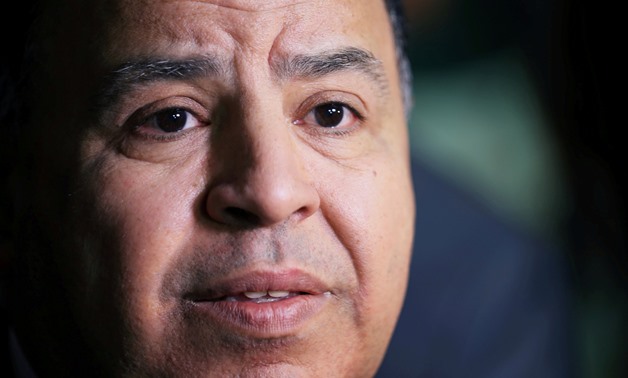
FILE PHOTO: Finance Minister Mohamed Maait speaks during a news conference in Cairo, Egypt July 5, 2018. REUTERS/Mohamed Abd El Ghany/File Photo
CAIRO – 5 September 2021: Egypt’s Minister of Finance Mohamed Maait affirmed that the Egyptian economy has become more capable of facing challenges and meeting the aspirations of the people, referring that it ranked second globally in the "Economist" index for the return to pre-pandemic life.
Maait stated that this reflects the government's success in the elaborate implementation of the economic reform program, in a way that contributed to enabling the Egyptian economy to contain the repercussions of the pandemic.
The Egyptian minister explained, in a statement, Sunday that the last fiscal year witnessed an improvement in financial performance indicators, as the total deficit decreased from 8 percent to 7.4 percent, and an initial surplus of 1.4 percent of GDP was achieved.
The minister added that all international rating institutions maintained Egypt's credit rating with a stable outlook despite the pandemic, which reflects its confidence in the solidity of the Egyptian economy and its ability to deal flexibly with internal and external challenges.
Maait pointed out that President Abdel-Fattah El-Sisi is leading the largest development movement to change the face of life on the land of Egypt, pointing out that the national project for the development of the Egyptian countryside, “Hayah Karima” is one of the best development programs in the world, according to the testimony of the United Nations, as it contributes to raising the rates of economic growth that are more comprehensive and have an impact on people's lives; It leads to improving the lives of 58 percent of Egyptians with investments exceeding 700 billion pounds within 3 years.
He explained that there are promising investment opportunities in major national projects in Egypt that attract international development partners, and that we are continuing to stimulate economic activity and deepen the development partnership with the private sector, which contributes to achieving comprehensive and sustainable development.
The minister pointed out the Egyptian government's keenness to stimulate the investment environment, by modernizing and mechanizing tax and customs systems to enhance governance, facilitate the business community, and expand digital transformation projects, in a way that helps integrate the informal economy and obtain the right of the state.
“In Egypt, we are keen on the stability of tax policies in the structural reforms package to attract investment,” he said.
According to the minister, the Egyptian customs system has witnessed a qualitative development, as importers are dealing with it by accessing the unified electronic platform for national trade through “smart phones.” The tax system has also witnessed a qualitative development, and major financiers can also deal electronically through the automated unified tax procedures platform without the need to go to tax offices.
He stressed that there is a growing interest in achieving human development, and that the allocations for the health and education sectors in the state’s general budget for the current fiscal year have exceeded the constitutional entitlement rates, and the gradual introduction of the “comprehensive health insurance” system to provide integrated health care for all Egyptians.
Maait explained that government investments during the current fiscal year witnessed an unprecedented increase of 27.6 percent to maximize spending on development projects.
The minister said that the World Bank estimates, in a recent study, that spending on social protection programs reached 4.2 percent of GDP in the fiscal year 2019-2020, and that poverty rates decreased by 5.2 percent with direct support programs for the most needy groups.
He pointed out that the Egyptian government is keen to diversify sources of funding, and that Egypt will enter the "sovereign sukuk" market in 2022, explaining that investors' demand for the first offering of green international bonds reflects their confidence in the Egyptian economy.
The Minister of Finance, Mohamed Maait, had participated in the annual meeting of the Islamic Development Bank Group in Uzbekistan, in the presence of the ministers of finance, economy, planning and international cooperation, other ministers in member countries, and representatives of the business sector and civil society; to discuss ways to advance innovation, partnerships, Islamic finance and value-added chains; In order to support the economic and social development of the member states.
Mohamed Maait, Minister of Finance, and Hala el-Said, Minister of Planning, met with Mohamed Al-Jasser, President of the Islamic Development Bank, who welcomed Egypt's hosting of the next annual meeting of the Islamic Development Bank Group.
It was agreed to enhance cooperation between the two sides in the field of exchanging experiences on the issuance of sovereign sukuk, encouraging the private sector to deepen development partnerships, designing systems to deal with potential financial risks, and evaluating government contracting systems.
The Minister of Finance and Planning also met Ayman Al-Sigini, President of the Islamic Corporation for the Development of the Private Sector, and the two sides agreed to work to raise the level of cooperation; To include the issue of sovereign sukuk issuance, so that a training program will be launched for this purpose in the month of October, in addition to encouraging trade with African countries, and supporting development projects aimed at empowering women.
Comments
Leave a Comment